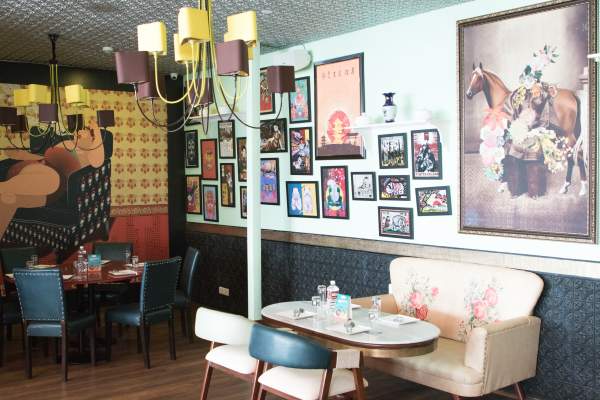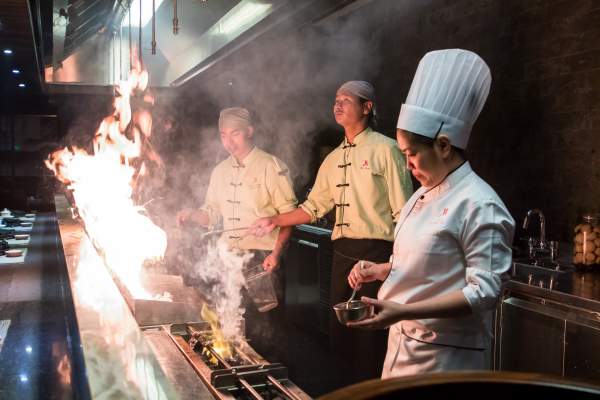Quick questions with singer Prabisha Adhikari
Q. What is your favorite venue to perform in?
A. Hyatt.
Q. If you had only one day left to live, what would you do?
A. Spend time with my family, leaving everything else behind.
Q. Which celebrity do you most admire and why?
A. Rajesh Hamal as he is an intellectual person as well as a senior artist.
Q. Your pet peeve?
A. Attitude of pretentious people.
Q. Your favorite travel destination?
A. Rara.
Q. Your alternate career choice?
A. Entrepreneur.
Q. If you could go back in time, where would you go?
A. Back to my school days.
Q. Your favorite genre of music?
A. Classical.
Q. The best advice you’ve been given?
A. ‘Be yourself’.
Q. Which is the best of your released songs?
A. “Phool hoina”.
Many takers of menstrual cups
When APEX ran a story on menstrual cups last year, we found most of our readers hadn’t even heard about the little silicone bulbous objects that are inserted into the vagina to collect menstrual blood. There were only a handful of users. And it was pretty difficult to find stores selling them. But these ‘life-savers’ for working women have found many takers of late. Shristi Shakya, executive assistant at Putali Nepal that sells these cups, says in the past one year “both sales and awareness have increased.”
Most women who have started using menstrual cups seem pleased with the result. Compared with sanitary pads, menstrual cups are more comfortable, portable, odor-free and environmentally-friendly, they said. Devashree Niraula, 24, who started using menstrual cups this April, can now sleep better during her periods. Earlier, she used to wake up with uncomfortable leakages every few hours. Niraula “highly recommends” menstrual cups.
These cups are available at various prices. PeeSafe has been selling them at Rs 799 apiece, which makes it among the cheapest in Nepal. According to PeeSafe importer Rajat Sarawgi, these India-made products are cheap “despite being made of 100 percent medical grade silicone and manufactured in a germ-free facility”. There are more expensive versions available too. The UK-made PeeSafe sells for Rs 2,500 apiece. At first blush the prices might seem a touch high. Yet in the long run these reusable cups that last up to five years are cheaper than pads.
Not everyone is sold on them though. Dr Aruna Upreti, a reproductive health expert, is uncomfortable with the idea of women inserting foreign objects into their body. “Using menstrual cups incorrectly may even lead to infertility,” she cautions. And she doubts rural women who are ill-informed about reproductive health will be able to use them effectively and hygienically.
But can’t sanitary pads also cause problems if used incorrectly, menstrual cup backers retort?
It bears keeping in mind that although menstrual cups are still relatively new in Nepal, Leona Chalmers, an American actress, invented them way back in the 1930s. They have as such been “extensively researched” and if you follow proper guidelines there is nothing to fear, says Shakya of Putali Nepal.
Both Shakya and Niraula suggest that before using the cups, it is better to visit a store, inspect the cups, and find one that is right for you. This is a long-term investment. Take your time, they add, but make the best pick.
Why urban women are taking to menstrual cups
Shristi Shakya, who has been using menstrual cups since 2015, says Dr Aruna Upreti’s concern about the risks
of improper usage is valid. But she argues any sanitary product can cause problems if used incorrectly
For two years, Devashree Niraula had been thinking about using menstrual cups but she did not have anyone to talk to about it, and was a little scared of the idea of inserting a cup into her body. This April, after much online research on menstrual cups, she finally bought one. “It’s been a life saver. Finally I can sleep peacefully for eight hours during periods,” she says.
Earlier Niraula used pads, which she found uncomfortable while sleeping. “I always had the problems of leakage and odor. These problems persist even with the cup, but to a lesser degree. And sometimes the cup does not fit well,” she says. But as it had taken her two to three years to get somewhat used to pads, “I’m being patient with the cups as well.”
When Niraula shared her experience of adopting this ‘environmentally-friendly’ option on Facebook, she started getting lots of questions. “People seem curious. I’m sure many will switch to menstrual cups. I hope they do,” she says.
Cost and comfort
I had done a story on menstrual cups for APEX in September last year. Back then, it was difficult to get information as there were few sellers and users of menstrual cups, even in Kathmandu. For this story, I again spoke to Shristi Shakya, executive assistant at Putali Nepal. (I had talked to her for the previous story as well.) Shakya confirms that the number of users and sellers of menstrual cups has increased over the past year. Putali Nepal itself sells between 15 to 20 cups a month, at Rs 2,500 apiece.
“Many traders have started selling menstrual cups,” says Shakya. “Not all are high-quality though.” So how do we identify the good ones? “They come from a reputable manufacturer, are made of 100 percent medical grade silicone and have a usage brochure,” she replies.
PeeSafe, a seller on Daraz, an online shopping site, has been selling menstrual cups for Rs 799 apiece, one of the most affordable rates in Nepal. Rajat Sarawgi, CEO of Brand Bucket, the importer of PeeSafe products in Nepal, assures that “it is made of 100 percent medical grade silicone and manufactured in a germ-free facility.”
PeeSafe sold over 50 menstrual cups last month, most of them online. Sarawgi says retail sales have not been good; he reckons people do not want to buy the cups in stores. “Some of the pharmacies we approached were not even aware about the product,” he adds.
Menstrual cups are PeeSafe’s best-selling product on Daraz. It also sells tampons and bio-degradable pads, but Sarawgi says menstrual cups are the real deal. “They last five years, and are both comfortable and economical,” he says.
As there are many sellers of menstrual products now, Sarawgi stresses the importance of looking at reviews before making purchases. “One should also research the appropriate size, and be cautious about knock-offs,” he advises.
Cup concerns
I asked Shakya why there is such a big difference between the price of their product and PeeSafe’s. She says there can be many reasons, such as the country from which the products are imported. While PeeSafe imports its menstrual cups from India, Putali Nepal does so from the UK. Just that? Shakya replies that higher production cost and better material could be other factors behind the higher retail price of the menstrual cups Putali Nepal sells.
With the increase in interest in menstrual cups, Shakya fears misinformation about them might circulate, potentially harming the industry. “Many brands of menstrual cups are sold online. One of them, which is sold on Daraz, has incorrect information on how to clean a menstrual cup once a period cycle is complete. It says the user has to soak the cup in hot water and dry it off in the sun. Actually, the cups have to be boiled in water and dried,” she says.
Putali Nepal, therefore, does not sell menstrual cups in bulk. It also gives training and brochures to its users (and other potential users). “Although menstrual cups are safe, effective and tested, users can still get infected if they do not follow certain guidelines,” says Shakya.
Dr Aruna Upreti, who has studied reproductive health, is against the use of such cups. Her main concern has to do with inserting foreign objects into the body. She questions if women who cannot tell between the urethra opening and the vaginal opening can properly insert a menstrual cup in their body. She thinks menstrual cups have been introduced for commercial gain without due concern to the health risks. “Using menstrual cups incorrectly may even lead to infertility. And if the cups are given to rural women, they may not use it in a hygienic way, which can easily lead to infection,” says Upreti.
“New does not necessarily mean better,” she cautions. “Just because this idea worked in Europe and the US does not mean it will work in a developing country like ours.” Upreti instead recommends bio-degradable sanitary pads, which are also an environmentally-friendly option.
Shakya, who has been using menstrual cups since 2015, says Dr Upreti’s concerns are valid. But she argues any sanitary product can cause problems if used incorrectly.
Insert with care
Niraula says inserting menstrual cups for the first time can hurt and may even require lubricant. When she has period cramps, she does not feel like going through the hassle of inserting a cup as she is not completely used to it yet. She would also not recommend teenagers to use it as “they may not have explored their body yet.”
Bidhya Maharjan, 22, shares a similar experience. Before she used a cup for the first time three years ago, she had no experience inserting anything into her vagina. It was painful and she thought she could not do it every month. Many of her friends now use menstrual cups and share their good experience with her.
“But I had a friend whose menstrual cup was stuck in her vagina and she could not pull it out,” says Maharjan. Initially, she also had some difficulty adjusting to the cup. There was the problem of leakage, for example. “But now I am very comfortable using the cups and would recommend them to others as well,” she says.
Pan Asian cuisine in Kathmandu
We are always looking for something a little different. Whether it’s in our choice of clothes, art or furniture. Food is no different. We like variety and like to see the creative on the plate. As eating out becomes more a way of life in Kathmandu many diners are looking towards food that appeals to them; not too unfamiliar and yet diverse enough to make them part with their money.
With its blend of flavors and cultures, Pan-Asian cuisine can do just that! A Pan-Asian menu consists of dishes from different countries from the whole of Asia. Whether it’s from China, Thailand, Indonesia, or Japan, if it appears on one menu, chances are you are in a Pan-Asian restaurant. In Kathmandu there are a few Pan-Asian restaurants opening up as people venture overseas on holiday and want to recall those memories by eating the same food. Or, for those who don’t get the opportunity to travel, eating Japanese or Thai food might be the next best thing to being there.
This week I looked at just two Pan-Asian restaurants: Mamagoto, a franchise out of India, and Edamame in the Marriott Kathmandu Hotel. While we all like to get value for our money, sometimes it is better to pay a bit extra and upgrade in terms of experience…
Mamagoto
Mamagoto: Japanese for “playing house” or “play with food” Having opened in Pani Pokhari earlier this year, Mamagoto is an amazing restaurant in terms of style. Its look is funky, quirky and fun with huge cartoon like posters on the walls and ceiling. This casual dining restaurant states it is a ‘fusion of inspiration from Asian street hawkers, our extensive travels, mad experiences and … secret kitchens…’ With three different seating areas, the restaurant can sit around 50 diners at a time. I’ve been here twice. Both times for lunch. Both times the restaurant was empty except for me.

Photo: Mahendra Khadka
Luckily the first time I had a friend with me and we made our own fun, taking photographs of the décor and ourselves. Service was slow but we hardly noticed. We wanted the platter to try out the different items on it. This was unavailable. We instead chose Thai Som Tam Salad (Rs 329), Street Chicken Satay (Indonesia, Rs 629), Gado Gado Salad (Indonesia, Rs 429) and Laksa Tribute (Rs 749/ 949/1399). Certainly everything tasted quite authentic, and I was more than happy with the Laksa which took me back to when I worked in Singapore. We tried some of the mocktails, Kiwi and Mint Collins (Rs 240), and Cranberry and Kaffir Lime Punch (Rs240). Pretty tasty too. After the salty and spicy we wanted something sweet. Unfortunately there was only Thai Sticky Rice and Mango and Ice Cream on the menu, both disappointingly small in size.
The second time I went was in order to write this review. After being given the menu it took a further 15 minutes for any waiter to come to ask if I wanted anything. I had previously asked for the lights to be turned on as well as the AC. The lights worked, the AC did not. It was stifling and airless inside. There was no music; no ambiance at all. The open kitchen echoed with the loud chatter of the staff. I guess no one had told the staff it’s supposed to be a fun experience restaurant. Yes, the décor is beautiful, and the food that I have tried was tasty and, to me, authentic, but if they want repeat customers the staff need to live up to the funky, bright, larger than life décor! Call 9810076824 for reservations.
Edamame by Marriott Kathmandu
Edamame: Japanese green soyabeans
Executive Chef Sanjeev Ranjan took us on a culinary tour of Asia in Marriott Kathmandu’s Pan-Asian restaurant, Edamame. And what a tour it turned out to be! We were greeted by smiling staff who settled us at our table. To identify each table, a small wooden log had its own unique spice name engraved in it.

Photo: Mahendra Khadka
We were seated at table Star Anise before being transferred to the private room which seats 10-12 diners. “Everything in Edamame is unique. From the spice table names, to the local looking place mats, the locally sourced tiger chopstick holders, to the imported chinaware,” explained Chef Ranjan.
Straight away we were served jasmine tea, water and an amuse bouche (French for a complimentary bite-sized hors d’œuvre). This was a wonderful sushi with delicate plating. Looking around the 56 seat room, I noticed each table was discreetly separated from the next for privacy.
There is also a live station which you would see in any sushi restaurant, where diners can sit around on very comfortable (and large, thank goodness!) high chairs/ stools.
Focusing on Thai and Japanese food, we were also introduced to Chef Somryethai Syksamai from Thailand (fondly know as Chef Ninja) and Krishna Dhungana, a Nepali who worked in Japan as a sushi chef for 19 years. Chinese style dim sum is also served. In fact we were told starting soon would be a dim sum set lunch menu at the weekends. Dinner is only served from 6.30pm onwards.
Between the dim sum, yakatori, sushi, soups, salads, main courses and desserts it was hard to know what to choose. But thankfully the menu is marked with the chef’s recommendations so we went for those. One of the highlights was the Flaming Salmon. And flaming it was, live at our table! Not a fish eater, I actually did enjoy the salmon, cut thinly as smoked salmon would be. The dim sum consisted of several different kinds ranging from Edamame and Truffle to Chicken Sui Mai (infused with beetroot to give it a bright red color). The Asian Mushroom dim sum was intriguingly black.
Having lived in Hong Kong and Singapore where dim sum is king, I thought these were outstanding in their lightness of taste and modern appearance. Next we were transported to Thailand with yakitori style Bangkok Street Flair. Oh my, I thought I had died and gone to heaven! Skewers of chicken, prawns, tenderloin and pork each had their own individual spices and sauce cooked through them. Nestled on a bed of mushrooms, ginger, red chilies and other spices I wanted to eat the whole lot myself!
But luckily I did not as the next course (under the mains) was Tamarind Sesame Duck Breast. Served with a duck mince filled bao with sesame seed snaps and a plum glaze this was duck breast taken to the next level!

Photo: Mahendra Khadka
Meantime, the Som Tam (green papaya salad) cleansed the palate while the Gang Khew Whan (homemade green curry) transported us to the Land of Smiles. The small selection of desserts includes Exotic Asian Fruits, Tab Pim Krob, or chestnut jelly with coconut milk, and Japanese Pancakes with bamboo ice cream. We settled for the Sangkaya Ob or baked coconut caramel custard. According to my dining companion, this can be found all over Bangkok. Somehow I have managed to miss it. It is very similar to a crème caramel, but with the Asian addition of coconut. I will not miss it next time!
We only took water and jasmine tea with our meal but there is a drinks menu, heavily focusing on Sake and Japanese whisky, but cocktails and mocktails are also available. At a price! In fact, overall, the menu prices were much lower than I anticipated. Except for the drinks. I haven’t mentioned food prices here as a new menu is due out within the next few days (with the same chef specials mentioned here), but as a rough guide expect to pay around Rs 2,500 for the meat and seafood dishes. With the exception of the lobster, which is much more.
Thinking about the ambiance of the restaurant I was pleasantly surprised to see that although I had thought Edamame would be ‘a bit posh’, it is in fact very relaxed and laid back. You could come for a business dinner or a family gathering, so flexible is the style. My only (and only) ‘constructive criticism’ is over the music they played. Definitely not very Asian, not even ‘modern Asian’ or in keeping with the overall feel of the place. Someone needs to look at that—please! A shout out to our wonderful waiter, Prakash Paudel, who made the evening even more enjoyable. For reservations call 01-4443040.
Brace yourself for ear-splitting Silence
The path to the 8th Silence Festival is all paved. And this year, Nepal’s biggest metal music fiesta features a heavy line-up of international artists, including the legendary ‘Testament’ from the US. Slated for December 14 at Tangalwood, Kathmandu, the Silence Festival has already sold out the limited number of early bird tickets it issued. But the audience can still buy tickets priced Rs 2,500 at the door. It’s an all-day concert and with the limited audience capacity you might want to get to the venue early.
Here we bring you a compilation of the international artists scheduled to perform.
Testament is an American thrash metal band from Berkeley, California. Formed in 1982 under the name Legacy, the band's current lineup comprises guitarists Eric Peterson and Alex Skolnick, lead vocalist Chuck Billy, drummer Gene Hoglan, and bassist Steve Di Giorgio.
Since its inception, Testament has had numerous lineup changes, leaving Peterson as the only constant member. In 1986, Billy replaced original singer Steve “Zetro” Souza (who left the band to join Exodus as the replacement for Paul Baloff), just before recording their first studio album, “The Legacy,” and has been a member since.
Testament is credited as one of the most popular and influential bands of the thrash metal scene, as well as among the leaders of the second wave of the genre in the late 1980s. They have also been referred to as one of the “big eight” of thrash metal, along with Metallica, Megadeth, Slayer, Anthrax, Exodus, Overkill and Death Angel. The band has sold over 1.4 million albums in the US since the beginning of the SoundScan era and over 14 million worldwide. To date, Testament has released 12 studio albums (one of which is a collection of re-recorded songs), four live albums, five compilation albums, 12 singles and three DVDs.

Burgerkill is an Indonesian metal band, originally from Bandung, the capital of West Java. Named after the fast food restaurant, Burger King, as a prank, the band was founded in May 1995 by Aris Tanto a.k.a. Eben, sometimes called ‘Ebenz’, then a young man from Jakarta who came to Bandung to continue his study. In Bandung, Ebenz met Ivan Scumbag, Kimung, and Dadan. These four comprised the first line-up of Burgerkill in 2013 and won Metal Hammer Golden Gods Awards in “Metal As F*ck” category.
Burgerkill was formed in Ujungberung region, located on the east side of Bandung city. Ujungberung is not only known as Metal Village, but also the center of Sundanese traditional art and culture, such as bela diri benjang, angklung, and kecapi suling.
Queso are a Filipino Rock band that enjoyed mainstream success in the late 1990s and early 2000s. The band eventually broke up after the release of their third album but reunited in 2012. At the height of their popularity, Queso (previously Cheese) were considered part of the Filipino Nu Metal genre. The band is best known for the single “Mottaka,” a song about friendship, from their second album “Pilipinas.”

The band’s former and current members all grew up in the local rock and metal scene. The band’s singer Ian Tayao and guitarist Ocho Toleran each has background in other projects and with different artists. Queso’s sound, especially in their final years before disbanding, evolved and became more experimental, blending Rock, Reggae, Funk, Folk, Dub, and Jazz.
Trainwreck is an American southern and comedy rock band, formed in LA, California in 2002. It was founded by Tenacious D guitarist Kyle Gass and actor JR Reed. The band originally started out as a three-piece, with Reed on vocals, Gass on guitar and friend Kevin Weisman as the drummer. The band had pseudonyms for its members. Reed was “Darryl Lee Donald”, Gass was “Klip Calhoun” and Weisman was “Kenny Bob Thornton”. Gass and Reed began to search for backing musicians, as they felt Trainwreck’s musical style was “too close to Tenacious D”.
The band met electric guitarist John Konesky and bassist John Spiker in Ohio through a mutual friend. The two Ohio men relocated to Los Angeles to form Trainwreck as “John Bartholomew Shredman” and “Boy Johnny” respectively. Nate Rothacker replaced Weisman as the drummer in the mid-2000s, going under the pseudonym “Dallas St. Bernard”. The band released one studio album, one live album, one EP and a single before splitting in 2010. It would reform in 2018 and announce a reunion tour, as well as a second studio album.

Godless slowly rose to the very top of India’s death metal class from their inauspicious origins in an exotic metal music scene. Interestingly, through this gradual but inexorable climb, the members band didn’t distinguish themselves so much for their innovations as for their unapologetic commitment to pure, unadulterated, lightning-fast, ear-shredding, thrash-influenced death metal.
Since their formation in mid-2015 by musicians who have been part of the Indian metal scene for years, the Hyderabad-based band has also broken into other old-school metallic forms.
Slowly developing their craft over the next year, singer Kaushal LS, guitarists Ravi Nidamarthy and Rohit Nair, bassist Abbas Razvi, and drummer Aniketh Yadav eventually recorded a four-track EP with the mission statement-like title of “Centuries of Decadence,” which was mixed and mastered by Joe Haley of Australian technical death metal band Psycroptic. After being brought under the Transcending Obscurity Records fold, Godless launched their EP in May 2016, which was met with rave reviews in media, including features in Rolling Stone India, Metal Hammer, Terrorizer, and XXL Rock.



















